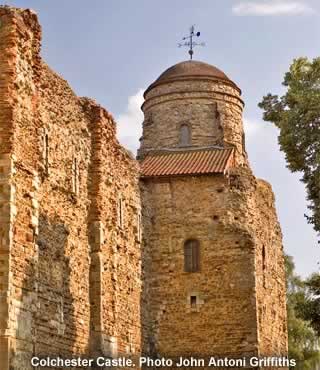Roman Britain |
|
 |
|||
Britain > Introduction > Roman Britain |
An invasion 1600 years ago, but the empire's effect on British society can still be clearly seen today |
Listen to this article |
Wars are started for lots of different reasons. Most often it's for treasure, or land. When the Romans first invaded England, it was for neither of these. It was simply so Julius Caesar could show off to his friends. |
This was in 55BC. At the time, Britain was inhabited by scattered groups and tribes. In the Romans' opinion, these people were mere savages who sacrificed children to weird barbarian gods. Caesar knew that a victory here would impress his compatriots back in Rome, and further his career. He made two invasion attempts altogether but, unfortunately, neither was especially successful. |
The Romans' next foray into Britain was nearly a century later. After an unexpected conspiracy, a man called Claudius had just become the new Emperor. He knew that, to hang onto his new position, he needed to impress everyone with a military victory. With that in mind, he sent his men across the Channel once more. This time they were ruthlessly efficient. It took them several years, but the Roman forces worked their way up the island with determination until the whole of England was under their control. |
The Emperor soon started developing his new territory. At first he built up the settlement of Camulodunum, now more commonly known as Colchester. This was just the beginning of the extensive constrution work that took place during Britain's Roman rule. The changes had only just begun. |
Next on the agenda were castles and forts. Understandably, the Romans were not very well-liked. They needed to be able to defend their land, so they built plenty of strong fortresses. |
Soon afterwards came the towns. These large new settlements were the first in Britain's history, and they were fabulously well-organised. Their streets were laid out in straight, criss-crossed rows, so it was easy to find your way around. The buildings included houses, shops, offices and theatres, all made from stone or brick. The amenities on offer included drinking fountains and restrooms. Aqueducts were built to bring water in, and underground sewers took waste back out. |
The Romans funded their construction projects by taxing the locals. However, as long as people paid their money, and didn't bad-mouth the Emperor, they were largely left alone. Britain turned into quite a peaceful place. |
One exception was up on the Scottish border. The northern tribes resisted any invasion attempts with a terrifying ferocity. The Romans decided to abandon the place, and seal it off. They did this by building a huge wall across the entire north of England. It was named after Hadrian, who was Emperor at the time. The defences took 14 years to complete but, when they were finally finished, they were practically impregnable. Hadrian's Wall was nearly 5 metres high and an incredible 117 kilometres long. It repelled hundreds of Scottish raiders, and provided a strong symbol of the Emperor's power. |
The wall was the largest structure that the Romans ever built, but their architects made plenty of other achievements in their time. They were responsible for England's roads, which were all as straight as an arrow. They also erected hundreds of bathhouses, usually situated in the busiest parts of the busiest towns. For the Romans, bathing was an immensely pleasurable activity. These public venues were among the most spectacular of their constructions. The best example was at the city of Bath, which used naturally-heated spring water. |
Altogether, the Romans controlled Britain for nearly 400 years. By that time, the country had started to drift apart from the empire which once controlled it. When the Saxon raiders arrived at the start of the 5th century, the Britons asked Rome for help. However, none came. Some troops were even transported back to Italy, which was itself under attack from barbarian invaders. This marked the end of Roman rule in England. |
That was around 1600 years ago, but the empire's effect on British society can still be clearly seen today. They set up our towns, which continue to flourish. Their buildings were so sturdily made that many of their remains can still be seen today. Even more significantly, we still use their calendar, and have been strongly influenced by their laws. Names like "Britain" and "London" descend from their titles. Even the language we speak has evolved from Latin, the Roman tongue. Even if we don't realise it, we're paying tribute to them every time we open our mouths! |
|
Pocket Britain is optimised for use on a smartphone or tablet with internet access. All content is subject to copyright. All reasonable methods have been used to ensure information supplied is accurate at the time of publication. However, it is advisable to check information before relying on it. Privacy Policy |